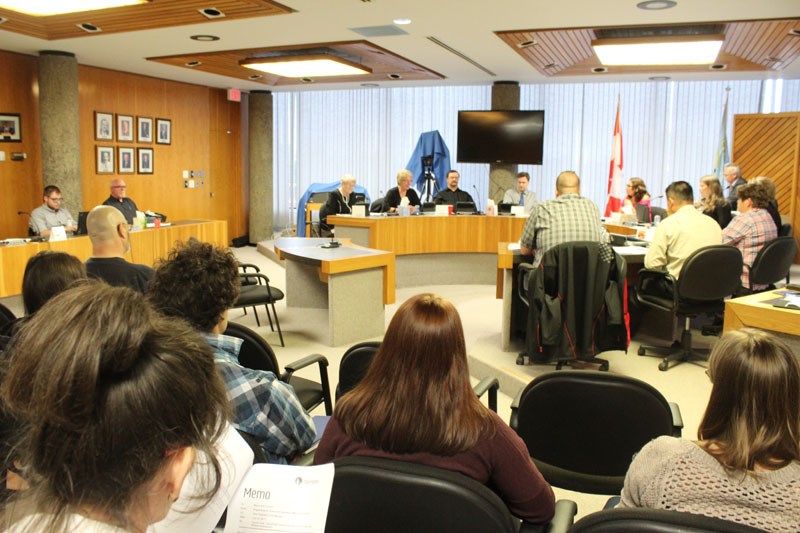With 17 resolutions on the agenda, members of the Thompson city council had a full plate to contend with for their July 17 meeting at City Hall.
While most of these resolutions passed without any major discussion, two of these items sparked spirited debate amongst certain members of the council.
Four-wheel good, two-wheel bad?
Although this item has been brought up at previous meetings, council remained divided on the issue of purchasing two half-ton, two-wheel drive trucks for the city’s public works department.
The biggest opponent of this resolution to tabulate prices for the purchase of these vehicles was Coun. Duncan Wong, who believes four-wheel drive trucks are much more appropriate for a city that experiences such extreme weather during the winter.
While Wong admitted that buying four-wheel drive trucks may cost more in the short term, he argued the city would end up paying more if public works employees are unable to perform their job during a major snowfall.
“Do the math. How much would it cost the taxpayer for one day, just one day in a year, where they are stranded, they cannot work, they cannot go out because of the two-wheel drive?” he said. “With four wheel at least you have more chances to go around and get the job done.”
Similar to how things played out at the May 8 council meeting, Wong’s biggest allies during this discussion were councillors Ron Matechuk and Judy Kolada, who are both concerned that the city’s current fleet of vehicles is limited when it comes to traversing severe road conditions.
“I’m not suggesting all vehicles in the City of Thompson should be four-wheel drive, but we should have at least a couple for emergency purposes and hopefully we can work on that in the next budget,” said Matechuk.
Despite efforts to table this issue for further discussion, the council passed this resolution by a 6–3 margin, with councillors Wong, Matechuk, and Kolada voting against it.
Mining Community Reserve Fund
Later on in the evening, the council brought forward a new resolution to apply for a Mining Community Reserve Fund, worth upwards of $10 million, to help mitigate the 700 job loses that are facing the community in the fall.
While this resolution received widespread support, several councillors raised questions about how they are going to allocate this potential $10 million. Wong even moved to have this resolution tabled until the specifics of this fund could be ironed out.
However, Mayor Dennis Fenske reminded council that this resolution only serves to get the ball rolling on sending this application to the provincial government and doesn’t specify what they will be spending this money on. He said it is important to send this application as soon as possible given the economic obstacles they are facing on the horizon.
“As I just stated, we are losing 700 jobs, the largest job loss to a single community in Manitoba. If that’s not serious, if that’s not a disaster, then I don’t know what is,” he said. “This letter serves notice to the province that we’re coming after that money.”
Deputy mayor Kathy Valentino also pointed out that it took the council three years to convince the provincial government to waive the $1.5 million in taxes on the transfer of the water treatment plant.
After a few more clarifications, Fenske ended the discussion by emphasizing the importance of showing a united front on this issue.
“If this is not a unanimous vote, what message are we sending to the province of Manitoba?”
Ultimately, council passed this resolution by a vote of 8–1, with Wong being the only holdout.
Other business
Council also took some time at the beginning of the meeting to hand out certificates of appreciation to members of the community.
First up was Ellie (Elizabeth) Winship, who was recognized for achieving the national Confidence Girl Greatness Award from the Girl Guides of Canada. The council also celebrated recent R.D. Parker Collegiate graduate Larissa Einarson for being the recipient of the 2017 Premier’s Healthy Living Award for Youth.
Chief financial officer Jenny Krentz also went through the city’s 2016 financial statements analysis, which highlighted their consolidated financial statements for the year ending on Dec. 31, 2016.
In the opinion of external auditors Kendall & Pandya, the results of the city’s operations, change in net financial assets, and cash flows of the year are in line with the Canadian Public Sector Accounting Standards.
To read these statements in full, please visit the “Finance” section of the city’s official website.
The next city council meeting is set to take place on Aug. 14 at City Hall.




